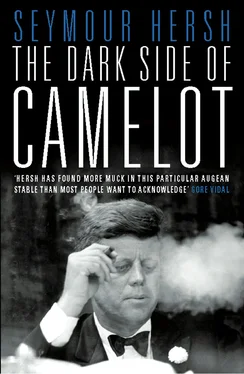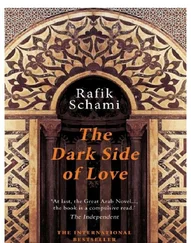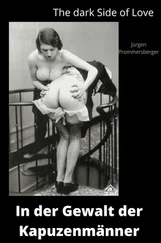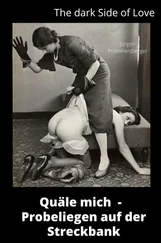The interview eroded Kennedy’s public support and ended his dreams of being elected to high public office in 1940. It also gave his enemies the courage to be his enemies.
Roosevelt finally lashed out at Kennedy after a private meeting with him at Thanksgiving; Kennedy was to be a weekend guest of the president and his wife at their estate at Hyde Park. It is not known precisely what took place, but Roosevelt ordered Kennedy to leave. Eleanor Roosevelt later told the writer Gore Vidal that she had never seen her husband so angry. Kennedy had been alone with the president no longer than ten minutes, Mrs. Roosevelt related, when an aide informed her that she was to go immediately to her husband’s office.
So I rushed into the office and there was Franklin, white as a sheet. He asked Mr. Kennedy to step outside and then he said, and his voice was shaking , “I never want to see that man again as long as I live. Get him out of here.” I said, “But, dear, you’ve invited him for the weekend, and we’ve got guests for lunch and the train doesn’t leave until two,” and Franklin said, “Then you drive him around Hyde Park and put him on that train.” And I did and it was the most dreadful four hours of my life.
Just what happened between the two men is not known, but Vidal, recounting the scene in a 1971 essay for the New York Review of Books , quoted Mrs. Roosevelt as wistfully adding, “I wonder if the true story of Joe Kennedy will ever be known.” (Discussing the scene years later, in an interview for this book, Vidal said he thought at the time that Mrs. Roosevelt’s real message was not only that the truth about Kennedy would not be known, but that it would be “too dangerous to tell.”)
Kennedy’s resignation as ambassador became official early in 1941. He would never serve in public office again.
Kennedy soon learned that having Roosevelt as an enemy meant having J. Edgar Hoover as an enemy, too. Published and private reports available to the White House and the British Foreign Ministry early in 1941 alleged that a notorious Wall Street speculator named Bernard E. “Ben” Smith had traveled to Vichy France in an attempt to revive an isolationist plan, favored by Kennedy, to provide Germany with a large gold loan in exchange for a pledge of peace. Kennedy, still intent on saving American capitalism from the ravages of war, was described in one British document as “doing everything in his power to try and bring this about.” Smith, known as “Sell ’Em Ben” in his Wall Street heyday, was identified as Kennedy’s emissary. In a confidential report to the Foreign Ministry dated February 4, Kennedy was reported to have sent Smith to visit senior officials of Vichy France in an effort to encourage “Hitler to try to find some formula for the reconstruction of Europe.… Having secured this, [Kennedy] hoped that, with the help of two prominent persons in England.… [he could] start an agitation in England in favour of a negotiated peace.” Roosevelt had learned of the Kennedy plan in advance, according to the Foreign Office report, and was able to abort it. Smith, a heavy contributor to Wendell Willkie’s presidential campaign, did travel to Vichy France in late 1940, but the plan went nowhere. On May 3, 1941, nonetheless, Hoover—getting his facts wrong—told Roosevelt that the FBI had learned from a “socially prominent” source that Kennedy and Smith had met secretly with Hermann Göring in Vichy, “and that thereafter Kennedy and Smith had donated a considerable amount of money to the German cause.” There was no evidence that Kennedy went to Europe with Smith, and no evidence that a meeting with Göring took place; but Hoover clearly understood that the discredited Kennedy was fair game—at least inside FDR’s White House.
By December 7, 1941, with Japan’s surprise attack on Pearl Harbor and America finally in the war, it was over for Joe Kennedy. Caught up in his ambitions and his fears for the world economy, he had failed to see how Franklin Roosevelt connected to the American people. Kennedy, with his relentless social climbing and political scheming, had been on the wrong side of the greatest moral issue in his life—the need to stop Hitler’s Germany. It was a mistake his son Jack would not make.
Joe Kennedy’s political ambitions shifted, with a vengeance, to his two oldest sons, who would become his political surrogates, and would get the benefit of his money, intellect, and willingness to do anything. Joe Jr. was completing navy flight training in Jacksonville, Florida; Jack, a navy ensign, was assigned to the headquarters of the Office of Naval Intelligence in Washington, where he was put to work writing daily and weekly intelligence bulletins.
Even with the war on, Jack Kennedy still managed to find time for partying. Just before the end of the year he initiated a torrid affair with a married Danish journalist, Inga Marie Arvad, who was estranged from her husband, a Hungarian movie director named Paul Fejos. Arvad, a former beauty queen, had interviewed Hitler and briefly socialized with him and other leading Nazis in 1936, while covering the Olympics for a Danish newspaper. She had been spotted by Arthur Krock while attending the Columbia School of Journalism in 1941. Krock recommended her to Frank Waldrop, the editor of the isolationist Washington Times-Herald , and Waldrop hired her to write a fluffy human interest column that focused on new arrivals to wartime Washington. Jack Kennedy was among those she interviewed. The handsome twenty-four-year-old navy officer fell in love with the older, more experienced, and far more sophisticated former beauty queen.
The FBI, alerted to Arvad’s meeting with Hitler by a jealous fellow reporter on the Times-Herald , marked her as a potential Nazi spy and began an investigation into her background. One early allegation, eventually discredited, was that Arvad’s uncle was a chief of police in Berlin. By early 1942, J. Edgar Hoover, at the direct insistence of FDR, became personally involved in the Arvad investigation. The next step was classic Hoover. Walter Winchell, firmly established as the FBI director’s favorite columnist, published the following item on January 12: “One of Ex-Ambassador Kennedy’s eligible sons is the target of a Washington gal columnist’s affections. So much so she has consulted her barrister about divorcing her exploring groom. Pa Kennedy no like.” A few days later, Hoover personally relayed a warning to Joe Kennedy, as JFK told it, that “Jack was in big trouble and he should get him out of Washington immediately.”
Eager to save his son’s career, Joe Kennedy arranged for Jack’s immediate transfer to a desk job at a base in Charleston, South Carolina. Jack continued, nonetheless, to meet with Arvad for the next two months, as the FBI—at Hoover’s direction—maintained round-the-clock surveillance, wiretapping her in Charleston and at her apartment in Washington. Agents even broke into her apartment to plant eavesdropping devices and to search through her papers and other belongings. No evidence linking Arvad to any wrongdoing was found, but the FBI—and Hoover—accumulated a large file of explicit tape recordings of the lovers at play. Joe Kennedy was overheard on the FBI wiretaps discussing politics with his son, who, the transcripts showed, was writing drafts of his father’s speeches. One FBI summary, as reported in JFK: Reckless Youth , by the British biographer Nigel Hamilton, showed that Joe Kennedy had political ambitions at an early stage not only for Joe Jr., as is widely known, but also for his second-born son. The FBI summary said Jack told Arvad that his father had stopped fully defending his very unpopular political positions in public “due to the fact that he believed it might hurt his two sons later in public.” The FBI wiretaps further showed that Arvad, while involved with Jack Kennedy, was also spending some nights with Bernard Baruch, the international financier and stock market speculator, who was close to the White House. *
Читать дальше












